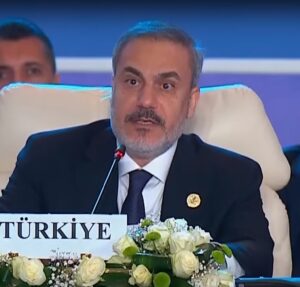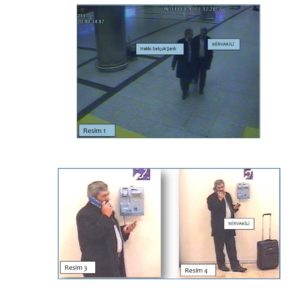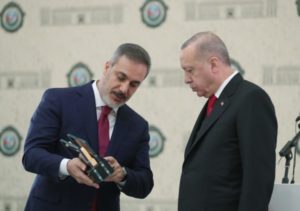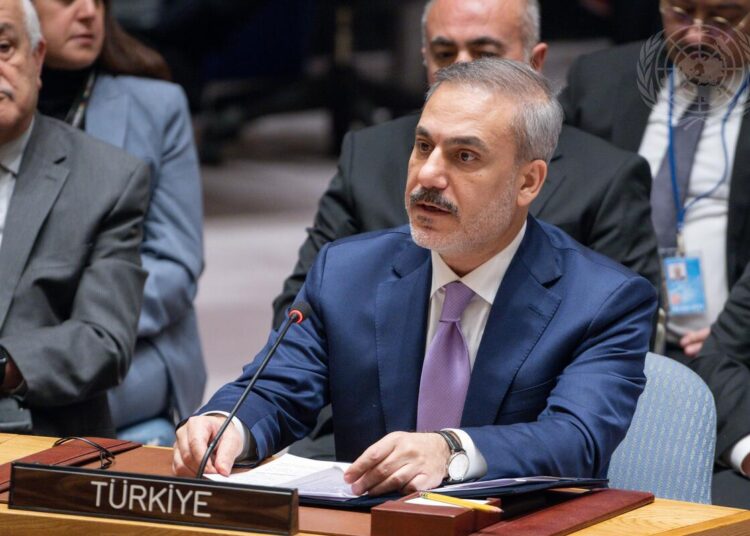Abdullah Bozkurt/Stockholm
The creation of a highly controversial armed unit within Turkey’s foreign ministry, under the leadership of Hakan Fidan — the former intelligence chief and current foreign minister — raises serious concerns for Turkey’s partners and allies.
Fidan’s decision follows his earlier transformation of Turkey’s diplomatic service into an extensive intelligence network, conducting espionage in foreign nations, including NATO allies. Despite warnings and protests over similar aggressive spying activities during his decade-long tenure as head of Turkey’s National Intelligence Organization (Milli İstihbarat Teşkilatı, MIT), Fidan remains undeterred, with the full support of President Recep Tayyip Erdogan for these clandestine operations.
Fidan, who became foreign minister in 2023, stated in a September 19 interview that the new unit would not only be responsible for the physical security of Turkish diplomatic missions abroad but will also handle cybersecurity and counterintelligence efforts.
Emphasizing that he recognized the need for such a unit during his tenure as head of MIT, Fidan said, “Turkey’s diplomacy is now, so to speak, soaring; we are managing very critical issues and are in constant communication with our missions.”
What Fidan did not publicly disclose is far more alarming and subtly embedded in the text of Presidential Executive Decision No. 163, published in the Official Gazette on September 13, 2023. This decision authorized the creation of the new armed unit, revealing details that were cleverly buried within its provisions.
Text of the presidential decree authorizing the establishment of the new security unit in the foreign ministry on September 13, 2023:
The primary mandate of the newly established Directorate General of Diplomatic Security (Diplomatik Güvenlik Genel Müdürlüğü, or DGGM) is, on the surface, to bolster the safety and security of Turkey’s approximately 260 embassies, consulates and other diplomatic missions around the world.
The directorate is managed directly from its headquarters in Ankara, leaving ambassadors and consuls general with little to no influence over the operations of personnel recruited by the DGGM. This unit will report directly to Fidan and will be guided by directives and assignments issued by the foreign minister himself.
Prior to the establishment of the new directorate, the security of Turkish diplomatic representations was managed by the Support Services General Directorate (Destek Hizmetleri Genel Müdürlüğü), which delegated security responsibilities to other branches of the Turkish government, typically the police, the largest law enforcement agency in Turkey.
The DGGM will also oversee the management of diplomatic cargo and couriers sent to and received from abroad as well as manage the necessary communications and preparations to secure bags and cargo loads. This is crucial for Fidan’s efforts to transform the foreign service into a vast intelligence apparatus, facilitating the movement of cash, supplies and other logistical materials across borders that would otherwise be challenging. He intends to leverage diplomatic couriers, who enjoy immunities under Article 27 of the Vienna Convention on Diplomatic Relations, to transport equipment and intelligence.
The new directorate also assumes the responsibility of providing security for foreign missions in Turkey, a role previously filled by the Protocol General Directorate (Protokol Genel Müdürlüğü), which had delegated this task to local law enforcement agencies. This shift grants Fidan a pretext for expanding surveillance and espionage operations targeting foreign embassies and consulates in Turkey, leveraging the new powers conferred by the directorate.

During his tenure at MIT, Fidan aggressively targeted foreign embassies and consulates in Turkey, particularly Western missions. He leaked some of the information gathered to advance the political objectives of the Erdogan government during election campaigns or to bolster its position in challenging negotiations with other countries.
The DGGM will also assume certain powers from the Information Technologies General Directorate (Bilgi Teknolojileri Genel Müdürlüğü) at the foreign ministry to conduct comprehensive cyber operations. It will be responsible for providing cybersecurity for both the headquarters and Turkish diplomatic missions abroad.
Once again, under the pretext of enhancing cybersecurity, Fidan aims to expand his influence operations online and secure additional resources for the troll army he has established, which is already active in promoting his candidacy to succeed President Erdogan.
The most concerning provision in the presidential decree is Section G of Article 6, which states that the DGGM will carry out “any assignment given by the [foreign] minister.” The wording is exceedingly vague, with no specifications regarding the nature of these assignments. This ambiguity appears to be deliberate, effectively providing carte blanche for Fidan, who can order the armed unit to undertake any task he deems appropriate for advancing his agenda.
Another provision stipulates that the DGGM will provide protective details for foreign delegates and nationals if the foreign minister deems such protection necessary while they are in Turkey. Fidan has a troubling track record of abusing protection protocols from his time as head of the intelligence agency. Nordic Monitor previously revealed, based on classified surveillance documents, how Fidan assigned intelligence officers to protect US-designated IRGC General Behnam Shahriyari, known in Turkey as Sayed Ali Akber Mir Vakili, in 2013.

Fidan also met personally with Shahriyari, facilitated his meetings with senior Turkish leaders and even lent the intelligence agency’s jet to transport him back to Tehran. Shahriyari was a leading suspect in Turkey’s counterterrorism investigation into the Quds Force between 2011 and 2014, and the police were monitoring his activities as part of this investigation under the supervision of veteran public prosecutors in Istanbul. However, the investigation was abruptly halted by President Erdogan before prosecutors could secure arrest warrants for the suspects, who included members of Erdogan’s inner circle.
As the current foreign minister, Fidan may leverage the newly established DGGM for similar illegal activities involving foreign nationals, whether they are Quds Force operatives or leaders of radical Islamist groups who visit or find refuge in Turkey.
The DGGM is also granted the authority to provide security training not only for personnel of the foreign ministry and any public officials assigned to serve abroad but also for any individual deemed eligible for such training by Fidan. This broad mandate lacks specific qualifications or criteria for selecting these individuals, thereby opening the door for non-officials and even foreign nationals to enroll in DGGM training programs.
The DGGM will draw upon not only the police and military for recruitment and the procurement of materials, including arms and ammunition, but will also utilize any government agency it deems appropriate to obtain such resources.
Fidan stated that the new directorate will leverage his expertise from his time at the intelligence agency, where he also established a similar armed unit — an unprecedented move in the history of Turkey’s intelligence service. Before Fidan took the helm of MIT in 2010, the agency primarily focused on intelligence gathering, information collection, analysis and the development of networks of informants and assets both domestically and internationally. It did not engage in armed operations or assignments deemed offensive in foreign territories.
When MIT required muscle for clandestine operations involving arms and ammunition, it typically called on the special forces of the Turkish military, the police, or the gendarmerie. However, Fidan transformed this approach by expanding the special operations section of MIT, recruiting veteran special operations officers from other agencies with higher salaries, and putting former military personnel in charge of military-style operations conducted by MIT beyond Turkish borders.
Kemal Eskintan, a former military officer, headed the special operations section on behalf of Fidan at the intelligence agency, overseeing armed jihadist groups in Turkey and abroad to advance the political objectives of the Erdogan government. This section was also responsible for the abduction of Erdogan’s critics, particularly members of the Gülen movement, which is inspired by the US.-based Turkish Muslim scholar Fethullah Gülen, both in Turkey and overseas.

Through legislative changes advocated by his boss, President Erdogan, Fidan secured complete immunity for MIT agents from criminal investigations. He also facilitated the procurement of heavy weaponry, including missiles and armed drones, for the agency, and accessed the vast multi-billion dollar defense fund previously managed by the military to purchase high-value defense materiel.
To advance the political objectives of the Erdogan government both domestically and internationally, the agency was empowered to enter into contracts with armed groups, including the Islamic State in Iraq and Syria (ISIS), and to release their captive members from Turkish prisons. Some of the deadly terror attacks that occurred in 2015 and 2016 are believed to have been linked to these contracts, with MIT facilitating operations carried out by ISIS and the Kurdistan Workers’ Party (PKK), both of which are designated as terrorist organizations in Turkey, the United States and the European Union.
Now, Fidan seeks to transfer this experience to the foreign ministry by establishing a new armed section within his portfolio as Turkey’s foreign minister. This marks an unprecedented development in the history of the Turkish foreign service and poses significant challenges not only for Erdogan’s critics and opponents but also for Turkey’s partners and allies.
Fidan has already integrated many MIT operatives, with whom he worked closely during his time at the agency, into critical positions in the foreign ministry. He enhanced the powers of the ministry’s intelligence branch, previously known as the Security and Research Directorate (Araştırma ve Güvenlik İşleri Genel Müdürlüğü), renaming it the Intelligence and Security General Directorate (İstihbarat ve Güvenlik İşleri Genel Müdürlüğü).
He will now be operationalizing the foreign service with personnel knowledgeable in arms and explosives training, sabotage, infiltration and the creation of false flags in foreign territories. This will inevitably result in more rigorous vetting, continuous scrutiny and constant monitoring of any member of the Turkish foreign service by other countries concerned about what the Erdogan government is planning with the new armed unit operating under diplomatic cover.












